|
|
|
Sort Order |
|
|
|
Items / Page
|
|
|
|
|
|
|
| Srl | Item |
| 1 |
ID:
161630
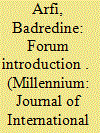

|
|
|
|
|
| Summary/Abstract |
Alexander Wendt’s Quantum Mind and Social Science: Unifying Physical and Social Ontology proposes a re-reading of many subjects and topics that have concerned IR theory over the last two decades through the quantum world and word. This book is situated quite uneasily in IR Theory: it touches upon many themes of IR theory while it understands itself to be situated beyond IR’s confines. Alexander Wendt readily admits that this book is more a treatise in social theory than ‘IR’ and he suggests that a third book will deal with ‘IR proper’.1 One could even say that this new book by Wendt is not even about a social theory of international politics as defined in his 1999 first – then groundbreaking – book. This book is about the philosophy of science and beyond … much beyond, even if the book does not always announce it as such.
|
|
|
|
|
|
|
|
|
|
|
|
|
|
|
|
| 2 |
ID:
131711
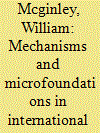

|
|
|
|
|
| Publication |
2014.
|
| Summary/Abstract |
This article looks at prospects for a mechanism-based research strategy in the study of International Relations. Over the past three decades, the notions of mechanism and microfoundation have taken a central place in discussions of explanation and 'micro-macro' problems in social science. The upshot of much of this discussion has been a call for mechanism-based explanations - explanations of macro-level phenomena in terms of micro-level mechanisms. Some work of this kind can already be found in IR theory, including in systemic research. However, a number of IR theorists, including Kenneth Waltz and Alexander Wendt, have argued that micro-oriented strategies like this will not work, pointing to incongruities between system- and unit-level phenomena. This article argues that these pose less hindrance to a fully-developed model of mechanism-based explanation, and that the field has much to gain from further exploration of this strategy. In particular, mechanism-based explanations could help bring structure back to the centre of discussion in IR theory, and might even give us a way out of the field's own micro-macro problems.
|
|
|
|
|
|
|
|
|
|
|
|
|
|
|
|
| 3 |
ID:
075742
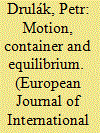

|
|
|
|
|
| Publication |
2006.
|
| Summary/Abstract |
The study of metaphors in political discourse provides an excellent opportunity to introduce discourse analysis to theories of European integration and international relations. This article suggests a framework of analysis for linking the study of metaphors with these literatures. In a first step, the article connects the International Relations concepts of macro-structure, micro-structure and internalization with the analogous concepts of conceptual metaphors, metaphorical expressions and sedimentation as used in the study of metaphors. In a second step, it examines key metaphors used in discourses on the future of the EU. The empirical analysis suggests that the metaphors of MOTION, CONTAINER and EQUILIBRIUM OF CONTAINERS are the most significant discursive representations of the EU.
|
|
|
|
|
|
|
|
|
|
|
|
|
|
|
|
| 4 |
ID:
187423
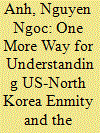

|
|
|
|
|
| Summary/Abstract |
In this essay, we attempt to use Alexander Wendt’s Hobbesian culture hypothesis to examine three aspects of US-North Korea relationship: (i) what kind of relationship it has belonged to, (ii) why it has not changed for over past 70 years, and (iii) what possible relationship between the USA and North Korea will be under the Biden Administration. The results show that Hobbesian culture has been dominating US-North Korea relations since 1949 when the USA did not recognize North Korea’s sovereignty and then launched unlimited war against North Korea in late 1950. Then the difference in internalization of the USA and North Korea to Hobbesian culture generated two opposing goals: while the USA pursues interests created by the existence of Hobbesian culture, North Korea pursues interests generated by the end of this Hobbesian culture. This is the main factor that has prevented a structural change over past 70 years. Theoretically, there may be at least three possibilities to change the structure of US-North Korea relations under the Biden Administration. But our examination of these possibilities show that it is hard for these possibilities to come true. It is suggested in this essay that the USA should try to improve its relations with North Korea by increasing US-North Korea interdependence. Once the interdependence is generated, the external restraint will be created. And when great enough, the interdependence will improve their relation and even create a structural change in the further future.
|
|
|
|
|
|
|
|
|
|
|
|
|
|
|
|
| 5 |
ID:
086152
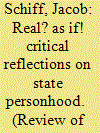

|
|
|
|
|
| Publication |
2008.
|
| Summary/Abstract |
In a 2004 forum, Alexander Wendt, Patrick Jackson, Colin Wight and Iver Neumann asked two questions about state personhood: Are states real, or merely as-if? Are they people? I question the terms of their debate, which relies upon a problematic distinction between 'real' and 'as if'. Drawing largely upon Foucault, I challenge that distinction. This challenge has important theoretical and normative implications. Theoretically, a discourse of state personhood is completely unnecessary to understand world politics. Normatively, by tightly linking personhood and responsibility, some of the authors obscure important dimensions of responsibility to and respect for the non-human world.
|
|
|
|
|
|
|
|
|
|
|
|
|
|
|
|
| 6 |
ID:
104985
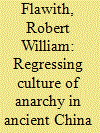

|
|
|
|
|
| Publication |
2011.
|
| Summary/Abstract |
What does the qualitative increase in the brutality of international relations in the Eastern Zhou period of ancient China (770-221bc) mean for the implicit progressivism of Alexander Wendt's constructivism, as espoused in his landmark text Social Theory of International Politics (1999)? Wendt's constructivism is useful in understanding international systems outside the contemporary Westphalian order and provides an excellent analytical tool for understanding ancient China. However, this article argues that Wendt's implicit teleology of progressively cooperative 'cultures of anarchy' in international politics is empirically questionable. It is demonstrated that such a progression is not supported by the historical evidence of ancient China, which represents an instance of an international system 'regressing' from a more to a less cooperative international social structure.
|
|
|
|
|
|
|
|
|
|
|
|
|
|
|
|
| 7 |
ID:
112410
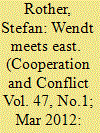

|
|
|
|
|
| Publication |
2012.
|
| Summary/Abstract |
The major theories of International Relations (IRT) differ significantly as far as their concepts of conflict and cooperation are concerned. However, they share one common denominator: They are deeply rooted in Western experiences and intellectual history. Recently, a growing literature on the possibilities and benefits of a non-Western IRT has emerged. This article proposes a 'via media': a theoretical approach that can be applied to Western and non-Western IR alike, taking into consideration the specific historical, ideational and cultural contexts. Based on social constructivism as developed by Alexander Wendt, it is argued that the existence of a collective identity among states in a given region can manifest itself in distinctive logics or cultures of anarchy. These are based on norms of conflict or cooperation that can be established through interaction, can be proposed by outside agents and localized, or can be affected by the re-negotiation of state identity caused by domestic events. In addition, there are cultural path dependencies: norms rooted in the cultural memory or consciousness of a region which tend to be ignored by interpretations that merely focus on current events or established Western models of cooperation. Area studies can contribute to provide this context.
|
|
|
|
|
|
|
|
|
|
|
|
|
|
|
|
|
|
|
|
|